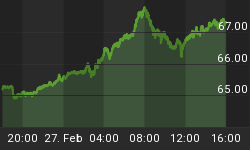I will give the Fed this much. Although they have historically been lousy forecasters, I think that at least a few of them may be dovish at this moment not just because they are always dovish, but because they believe there is a legitimate reason right now to be dovish. That is, they are afraid that the recent global retreat in equities is not merely a correction from lofty multiples - it is that, at least, of course - but signs of something more fundamentally amiss. Heck, a member of the FOMC suggested in the most-recent "dot plot" that negative policy interest rates may be appropriate this year and next year!
Probably, China scares them quite a bit; I am not sure it should because I think China's impact is generally exaggerated in terms of its effect on the US, given the relatively small amount of trade that we do with China, but it is reasonable to be concerned about that large economy right now.
The recent plunge in domestic manufacturing indices may also be disconcerting. While many of these are relative indices (are conditions better or worse than they were last month?) rather than absolute indices (how are conditions now, compared to what they were in some fixed base period?), it is difficult to ignore that today the Richmond Fed index dropped to -5 from 0, when +2 was expected, which puts it at the lowest level in a couple of years. Actually, the Richmond Fed Index alone would be quite easy to ignore, but last week's surprise in Empire Manufacturing (-14.67, versus expectations for a bounce to -0.50) made back-to-back months that were the worst since 2009; the Philly Fed Index fell to -6 when +6 was expected (and -6 is the lowest level since 2012); and both Capacity Utilization and the Michigan Sentiment index have continued their decline from highs set late last year.
At some point, even if these are all small fry, one begins to sense a pattern. Even if one has a Ph.D. in economics and works at the Fed!
So I will give the Fed credit, or perhaps I ought to say the benefit of the doubt, that they are delaying tightening because they perceive weakness on the horizon. I believe that they are likely correct in that. In my view, this does not mean the Fed ought not to tighten but merely means they are so far overdue that they completely missed the opportunity to normalize policy during the expansion and now face another recession with no bullets. Policy still needs to be normalized, but in this case that perhaps means returning rates not to the mid-expansion norm but the recession norm (say, 3% on Fed funds rather than 5% on Fed funds). However, I will give them credit at least for recognizing at last that they are in a box. I wonder how long it will take them to understand that the box is of their own making; that the Fed ought long ago to have led the world's central banks in raising rates rather than pursuing more and bigger QE to do what monetary policy cannot do well, if at all: buoy real variables.
And I will give credit to Governor Bullard, who is not always perhaps the sharpest knife in the drawer (why is it that whenever I give credit to the Fed it doesn't sound like a good thing?) but was spot-on when he dissed Jim Cramer on CNBC on Monday. Not that Jim Cramer is the only cheerleader for permanent easing to permanently support equities, but he certainly is a standard-bearer. Bullard said:
"I've got a message for your friend Jim Cramer. The Fed cannot permanently raise stock prices. The idea that the Fed is going one way or the other, and this is what's driving the stock market, is not true. He's one of the great people at looking at businesses, how good is this business, what's the profitability of the business, what's this thing worth? And to have him cheerleading for lower rates 24-hours a day is, I think, unsavory."
Unsavory, indeed.
A the least, I can empathize with the Fed's dilemma. They have missed a whole cycle by over-easing the last time around. Okay, that was all in the past. "Mistakes were made." So now what? What does the Fed do with growth evidently slowing, but inflation at the target and employment below the target?
What they should do, probably, is tighten with all due haste, but as I said above tighten to what is still an easy policy. The problem, as I have pointed out before, is that (a) this will cause a further acceleration in inflation, by tending to raise money velocity without a corresponding decline in money growth, and (b) there isn't a chance of them actually doing that. At this point, they may be stuck. Ray Dalio may be right. More QE...more disastrous QE...may be the next step. But let us hope that, having tried and failed by doing too much, our central bankers might attempt to succeed by doing as little as possible.
Administrative Note: For those who missed my appearance on Bloomberg TV's "What'd You Miss" program last Wednesday, here is a link to my segment: http://bloom.bg/1Jo7DDb Hope you enjoy!
You can follow me @inflation_guy!
Enduring Investments is a registered investment adviser that specializes in solving inflation-related problems. Fill out the contact form at http://www.EnduringInvestments.com/contact and we will send you our latest Quarterly Inflation Outlook. And if you make sure to put your physical mailing address in the "comment" section of the contact form, we will also send you a copy of Michael Ashton's book "Maestro, My Ass!"















